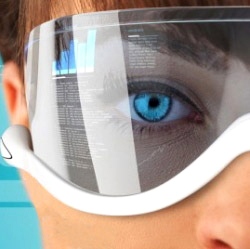
Facial recognition technology is, in some ways, the epitome of the loss of privacy in a digital world. No longer can a person disappear into a crowd or trust that his or her whereabouts at any given time will remain unknown. Wearable computers like Google Glass seem to offer the most disquieting case in point: The person who takes the identifying photo can do so without even revealing that they are doing so.
Facial recognition and wink-triggered cameras have been at the heart of the U.S. Congress’s concerns about Glass, and Google has responded by saying it will ban facial recognition apps from its marketplace of apps for Glass, or Glassware.
But where Google sees a privacy problem, the enterprising developers at FacialNetwork see a great use case for an eyeglass-mounted computer like Glass. They recently launched a facial recognition app for Glass, called NameTag, in the hopes of pushing Google to change its policy. The app will also run on Android and iOS smartphones.
“Making real-time facial recognition work on Glass hasn’t been easy, but we did it. Now, the question isn’t if we will support Glass; it’s will Google support us?” FacialNetwork’s brassy CEO Kevin Alan Tussy said in a statement.
NameTag compares a photo taken with Glass or a smartphone camera to its database of faces and returns the person’s name, additional photos and social media profiles.
If Google doesn’t approve the app for Glass, Glass users will have to download it from a gray-market marketplace. It’s currently available in an open beta exclusively for participants of Google’s Explorer beta-testers program.
Despite its finger-in-the-eye attitude, NameTag does have some privacy protections in place. To be recognized by NameTag, one has to have photos in the NameTag database. And for everyone except celebrities and those with a criminal record, that involves opting in and registering with the app. (FacialNetwork is working on additional apps that would compare online dating profile photos to mugshots in the National Sex Offender Registry.)
“People will soon be able to log in to www.NameTag.ws and choose whether or not they want their name and information displayed to others,” said Tussy. “It’s not about invading anyone’s privacy; it’s about connecting people that want to be connected.”
